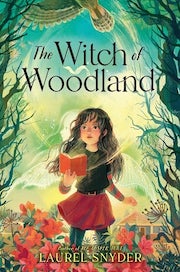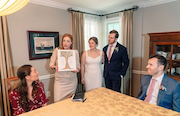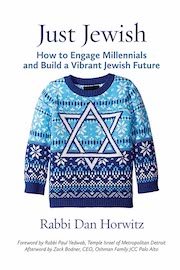There were several developments this month reflecting progress towards inclusion of interfaith families, and the need for more progress.
More Representation in Children’s Literature
 Laurel Snyder, an award-winning author of children’s books who grew up with a Jewish father and a Catholic mother, wrote a beautiful story about the importance of children seeing their kind of family represented in books. In her own latest, The Witch of Woodland, Snyder sees the journey of Zippy, the heroine that reflects Snyder’s life, “as authentically Jewish” and “was able to love Zippy for the very complexity of her identity and the bravery it took to examine herself and her community.” Snyder posted on Facebook her gratitude that her book, and another about intermarried families, were just named as finalists for National Jewish Book Awards in middle grade literature: “stories about kids navigating Jewish lives from outside what we understand to be the ‘norm.’” This is important progress, and we congratulate Laurel Snyder.
Laurel Snyder, an award-winning author of children’s books who grew up with a Jewish father and a Catholic mother, wrote a beautiful story about the importance of children seeing their kind of family represented in books. In her own latest, The Witch of Woodland, Snyder sees the journey of Zippy, the heroine that reflects Snyder’s life, “as authentically Jewish” and “was able to love Zippy for the very complexity of her identity and the bravery it took to examine herself and her community.” Snyder posted on Facebook her gratitude that her book, and another about intermarried families, were just named as finalists for National Jewish Book Awards in middle grade literature: “stories about kids navigating Jewish lives from outside what we understand to be the ‘norm.’” This is important progress, and we congratulate Laurel Snyder.
(In a piece from last September reflecting more progress, “My Own Bat Mitzvah Was Stressful. I Wanted Better for My Sons,” Snyder describes the damaging exclusion her mother experienced at Snyder’s bat mitzvah, and the inclusion her husband, their sons, and Snyder’s mother experienced many years later at the sons’ bar mitzvahs.)
Conservative Movement
JTA had a major story by Jacob Gurvis about a new report from the Conservative movement, summarized well in the article’s title: “Conservative movement maintains its ban on officiating at intermarriages but urges its rabbis to engage more with interfaith families.” There is a lot about this in the new report that I hope to comment on at a later time.
 Coincidentally, JTA had an earlier interesting story about a Conservative synagogue outside of Boston that hired a cantor who can officiate at weddings of interfaith couples (but not in the synagogue building) because she was not ordained in the Conservative movement and does not belong to its clergy associations. I have mixed feelings about this “half-way” or maybe “quarter-way” step, and more broadly about the movement’s approach. On the one hand, it’s good that interfaith couples will have an avenue to a Jewish clergy-officiated wedding with clergy affiliated with a Conservative synagogue (that’s convoluted, but it’s a convoluted situation). On the other hand, I continue to question how the movement can achieve a goal of engaging interfaith families while maintaining a no-officiation policy for its own clergy that is difficult to understand as other than an official disapproval of interfaith marriage.
Coincidentally, JTA had an earlier interesting story about a Conservative synagogue outside of Boston that hired a cantor who can officiate at weddings of interfaith couples (but not in the synagogue building) because she was not ordained in the Conservative movement and does not belong to its clergy associations. I have mixed feelings about this “half-way” or maybe “quarter-way” step, and more broadly about the movement’s approach. On the one hand, it’s good that interfaith couples will have an avenue to a Jewish clergy-officiated wedding with clergy affiliated with a Conservative synagogue (that’s convoluted, but it’s a convoluted situation). On the other hand, I continue to question how the movement can achieve a goal of engaging interfaith families while maintaining a no-officiation policy for its own clergy that is difficult to understand as other than an official disapproval of interfaith marriage.
October 7, Antisemitism, and Interfaith Families
 More stories are starting to appear about the impact on people in interfaith relationships of Israel’s war against Hamas and increasing expressions of antisemitism. In “I Chose for My Family to Be Jewish. Even After October 7, I Would Choose It Again,” Jennifer Cox, who is not Jewish, feels strongly, even defiantly, that “my children are not ‘half’ Jewish. They are Jewish. My family is Jewish.” She adds, “On October 7, and on every day since, Hamas terrorists and other antisemites haven’t differentiated between patrilineal or matrilineal Jews.” Her essay is a fascinating description of her and her Jewish husband’s different attitudes, experiences, and choices as they relate to current events. She concludes, “I chose for my family to be Jewish, and to whatever extent the choice is mine, I will choose it every time.”
More stories are starting to appear about the impact on people in interfaith relationships of Israel’s war against Hamas and increasing expressions of antisemitism. In “I Chose for My Family to Be Jewish. Even After October 7, I Would Choose It Again,” Jennifer Cox, who is not Jewish, feels strongly, even defiantly, that “my children are not ‘half’ Jewish. They are Jewish. My family is Jewish.” She adds, “On October 7, and on every day since, Hamas terrorists and other antisemites haven’t differentiated between patrilineal or matrilineal Jews.” Her essay is a fascinating description of her and her Jewish husband’s different attitudes, experiences, and choices as they relate to current events. She concludes, “I chose for my family to be Jewish, and to whatever extent the choice is mine, I will choose it every time.”
Tablet also had a piece about what Henry Wilhelm, a partner from a different faith background in an interfaith relationship, learned about antisemitism after October 7. Wilhelm happens to be in the process of conversion, but his perspective might be shared by many partners in interfaith relationships.
JTA reported that the horrible events of October 7 have fueled, for some, a renewed dedication to converting. A person featured in the story says, “I felt my need to be a Jewish mother was growing stronger, and my desire to be in Israel, to help and just to be unified with the people. So for me, this was the biggest push. I want to start my Jewish family.”
As we’ve said repeatedly, conversion is a wonderful personal choice that we support and celebrate. But we were troubled that a rabbi featured in the story is quoted as saying, “the perfect reaction to this war was creating really strong Jewish families.” We were troubled because conversion is not necessary to create strong Jewish families; if that rabbi met Laurel Snyder, or Jennifer Cox, maybe he would speak differently. The Forward also reported increased interest in conversion, without any similar judgmental hint.
Finally, the New York Times had a maddening story by Joseph Bernstein about a woman who “issued a call to ‘#MakeJewishBabies’.” In describing young Jewish women who in response to October 7 have “rediscovered the imperative to have Jewish children,” the story describes their seeking to do so only with Jewish men. There isn’t even a glimmer of recognition that interfaith couples raise Jewish children!
Dan Horwitz’ Important New Book, Just Jewish
Just Jewish: How To Engage Millennials and Build a Vibrant Jewish Future by Rabbi Dan Horwitz, the founder of The Well, has a lot of helpful advice on how Jewish organizations can build relationships, market, partner, develop programming and fundraise – and not just around millennials.
 What we appreciated about the book is the matter-of-fact acknowledgment of the prevalence of interfaith relationships and seeing them as an opportunity. This starts with the Introduction: “Jewish Millennials are globally connected, have mostly non-Jewish friends, and are living in interfaith households at an incredibly high clip (whether as products of an interfaith marriage and/or in one themselves).” Or the book’s end, “For those concerned about Jewish continuity, the math argues for viewing interfaith marriages as a Jewish communal growth opportunity.”
What we appreciated about the book is the matter-of-fact acknowledgment of the prevalence of interfaith relationships and seeing them as an opportunity. This starts with the Introduction: “Jewish Millennials are globally connected, have mostly non-Jewish friends, and are living in interfaith households at an incredibly high clip (whether as products of an interfaith marriage and/or in one themselves).” Or the book’s end, “For those concerned about Jewish continuity, the math argues for viewing interfaith marriages as a Jewish communal growth opportunity.”
Rabbi Horwitz has an interesting take on the interplay between the universal and the particular that applies to interfaith couples generally: “[T]here remains an important role for a particularistic community to play, and Millennials are willing to embrace the particular – so long as it’s not to the exclusion of the universal.” He suggests that the traditional particularistic fundraising pitch that “All of Israel are responsible for one another” will not resonate with many Millennials who are from or in interfaith relationships, and suggests a more universal pitch that emphasizes services provided to people of all backgrounds.
I appreciated the frequent mentions of the importance of inclusion of interfaith couples. The Well’s leaders decided to describe it as “inclusive” “to make it clear that as an organization we embraced interfaith couples, LGBTQ+ folks, etc.” and “were pleased to learn that for several of our interfaith couples, the word ‘inclusive’ is a signaling word they look for when trying to determine whether a Jewish organization will warmly welcome them.”
“If a Jewish Millennial feels that they can be their whole selves and include the people they love in what they’re doing, they’re much more likely to do Jewish… Part of our communal strategy should be … making sure they know their non-Jewish friends and partners are welcome…”
Rabbi Horwitz traces the response to interfaith marriage since 1990 and concludes that “while there are still some who are concerned with preventing these marriages…, much of the communal agenda has shifted to how best to welcome these families… viewing an interfaith marriage as welcoming someone new as opposed to treating the Jew who married a gentile as someone who has chosen to leave the community…” But he acknowledges, as 18Doors’ Jodi Bromberg writes, that many interfaith couples have “not found a Jewish community that felt comfortable for them or inclusive of interfaith families.”
Rabbi Horwitz acknowledges still-problematic issues of attitudes and policies. On officiation, he says, dryly, “Being turned away by rabbis when it’s time to celebrate their marriage and then hoping they’ll join synagogue communities where they experience rejection isn’t an ideal strategy.” Further, “Also troubling are the inevitable micro-aggressions that many of these couples are met with across denominations, as it’s still normative to hear people say to the parents of young children things like, ‘Just wait until he grows up and finds a nice Jewish girl to marry!’”
If I have one quibble, it’s with the sub-chapter heading, “Interfaithless Marriage” and with Rabbi Horwitz having “taken to referring to these couples as ‘interfaithless.’” I don’t think that terms that describe people (i.e., “non-Jew”) or relationships (i.e., “interfaithless”) as something they are not, is a good idea. He seems to define “interfaithless” as neither partner actively practicing their inherited faith in a traditional manner – but how liberal Jewish-Jewish couples are doing that?
Rabbi Horwitz says, based on working with scores of couples, some interfaith, that their desire for a rabbi to officiate, or traditions like breaking a glass, or to please their parents or grandparents, does not indicate anything “religious.” But there’s no reason to suggest that interfaith couples have less or different spiritual needs than Jewish-Jewish couples, or that they don’t want as much spirituality in their weddings.
I do very much appreciate where Rabbi Horwitz ends up:
“Being sensitive to the needs of these couples is key….The simple truth is that there are wonderful human beings in this world who don’t happen to be Jewish who will make wonderful partners for our own Jewish children… [O]ur focus must be on how we make being part of Jewish community so welcoming, joyous, meaningful, relevant and substantive that these couples can’t imagine not wanting to be actively part of it themselves and are excited about raising any future offspring within it as well…. Turning away, shaming, or simply ‘tolerating’ mixed-heritage couples as opposed to embracing them is a missed opportunity to begin forming lasting relationships with them.”
Also in the News
- HeyAlma had a powerful story by a college sophomore who calls for patrilineal Jews to proudly celebrate themselves. This especially resonated: “Like all groups, one’s identity being affirmed and celebrated is what indicates future commitment to it, and being excluded will … ultimately lead to feeling the need to leave.”
- Ha’aretz reported that the Education Ministry of Israel pulled funding from an annual all night learning event on the eve of Shavuot, that promotes pluralistic, progressive Judaism, because Israeli-Arab broadcast journalist Lucy Aharish, who is married to an Israeli Jew who is stars in Fauda, participated as the event’s host. The Director of the Division of Jewish Culture is quoted as saying, “We live in a ‘Jewish State’ and as the Wing of Jewish Culture, it makes sense that a woman who represents mixed marriage cannot represent Jewish culture.” Aharish said the Ministry was saying, “we judge you for being an Arab, you are not a part of us.”
- The forthcoming Rosov Consulting study, mentioned in our December newsletter, that recognizes the impact of attitudes and ideologies about interfaith marriage on interfaith families’ Jewish engagement, was discussed in eJewishPhilanthropy.
- A very interesting page on “Marriage Services,” from the website of Muslims for Progressive Values, notes, “we do not require conversion by the non-Muslim partner. Please view the theological basis for the permissibility for such a marriage at the bottom of the page.”
- There was a nice, matter-of-fact story in a Houston TX area local secular paper, about interfaith couples finding their community welcoming.
- In the Boston Globe’s “Ask Amy” feature, atheist parents asked for a second opinion on not celebrating Christmas with their child because “we don’t want to push religious messages;” Amy’s answer: “For many people, Christmas is more a commercial celebration than a religious one. If you wanted to, it would be possible to do the whole Christmas shebang without ever delving into any Christian thought or belief.”
